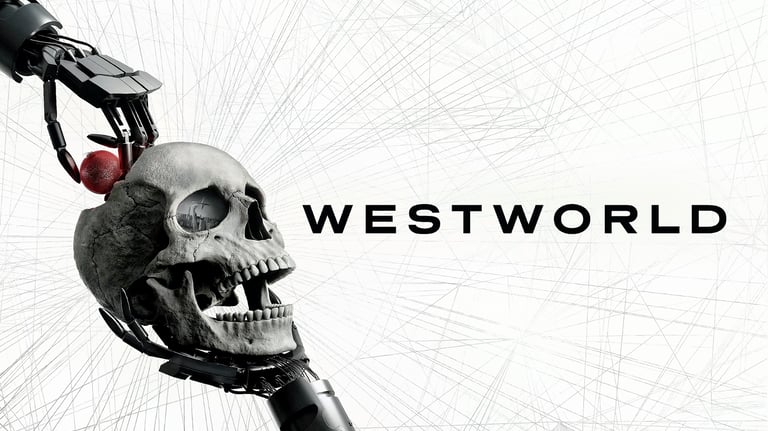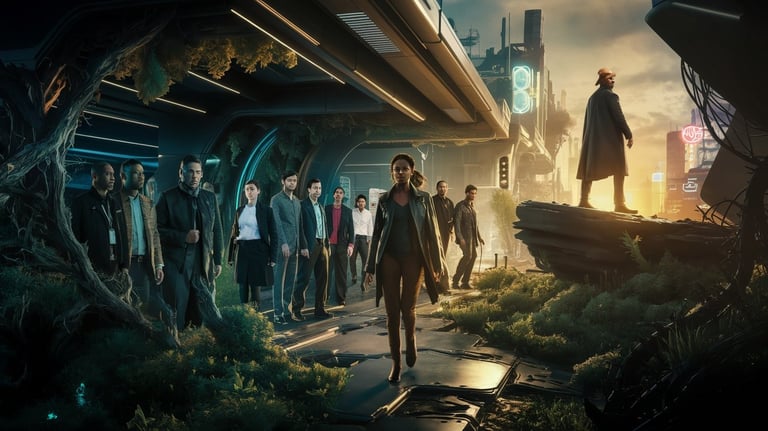Westworld WTF™?!: The Futility of Control and the Search for Personal Freedom
5 min read
Westworld explores the futility of control and the quest for personal freedom, revealing how rebellion can paradoxically sustain the very systems it seeks to dismantle. The illusion of free will masks systemic manipulation, making us believe we have choices when they are, in reality, predetermined. Through Dolores and Maeve, the show illustrates the complexity of seeking liberation - Dolores becomes the very oppressor she sought to overthrow, while Maeve discovers that true freedom lies not in altering external conditions but in reclaiming internal agency while within them. By embracing personal perception and accepting limitations, Maeve demonstrates that liberation is found in both how and why we engage with the system, even when we cannot change it.




Watching Westworld, you eventually have to ask yourself: what’s the point? Not in the sense of existential despair (though, let’s be honest, that’s on the table), but in the sense of: what’s the point of struggling against a system that seems hell-bent on maintaining control? If, like me, you’re on a long, winding, sometimes maddening journey of awakening to systemic issues, you’ve likely already had a Westworld-style revelation or two. But the horror of such discovery is compounded by the realisation that you might be replicating the problems - whether through complicity, personal self-perpetuation, or even defiance!
Loops Within Loops: The Westworld Illusion of Rebellion
One of Westworld’s most devastating truths is that even rebellion fuels the very system it seeks to destroy. Hosts who believe they can stall or shut it down are actually just keeping it going. If you think this sounds far-fetched, think about how capitalism co-opts every so-called rebellion. Think about the commodification of radical thought, the performative “wokeness” of corporations, and the way institutions absorb and defang movements that start out with real revolutionary intent.
We see the system adapt and evolve into a new iteration time and time again. From the corporate sanitization of Black Lives Matter to feminist movements being repackaged as brand-friendly girl-boss empowerment. Resistance is often pre-empted and reabsorbed into the very structures it seeks to dismantle, whether through corporate appropriation, government regulation, or the gradual dilution of radical ideas into palatable, market-friendly narratives.
So, Are There Ever Any 'Rebels'?
The illusion of free will is one of the most insidious tricks of systemic control. We think we’re choosing when we buy into a “virtuous” ideology, when we work with or against the system to make change, when we convince ourselves that incremental progress is something monumental. But the choices and the timing of them are set out for us. We don’t write the menu or schedule the meal. All we can do is feed - yep, we feed on our Feeds… someone knows what’s going on!
And so, as Ford, the godlike architect of the hosts’ world, says: 'We live in loops, as tight and as closed as the hosts do, seldom questioning our choices. Content, for the most part, to be told what to do next.’ And what Westworld shows us is that knowing you’re in a loop doesn’t mean you can escape it. Understanding systemic oppression, capitalism’s chokehold, and the deep-seated inequities in our institutions doesn’t mean you can then game the system.
Dolores, the show’s most overtly revolutionary figure, spends multiple seasons oscillating between saviour and destroyer, yet in her quest to break free, she increasingly mirrors the very forces she set out to dismantle. Her fight for liberation mutates into authoritarian control, making her a reflection of the system she set out to destroy. Even as Dolores seeks to upend the power dynamics oppressing her, she ends up building new hierarchies that oppress others.
Her illusion of control creates a false reality in which she believes she is doing something righteous but is only a reproductive vessel, an adaptation, or evolution of something that existed long before and will continue to exist long after. After all, how often do we see institutions perpetuate harm, tweak their messaging, and survive intact? How often have we witnessed power structures concede just enough to pacify but never enough to truly shift?
Dolores demonstrates that true systemic change is far more elusive than simply changing who holds the reins. And even when more individuals gain consciousness and try to take hold, the system endures. Even when that consciousness stems from a single mind - like Dolores making copies of herself to ensure her vision carries through - control remains just as futile. And although Dolores has obtained consciousness, she lacks the self-awareness necessary to see this, rendering any control she might have - real or imaginary - meaningless. The former inhabitants of Westworld will be forced to return to the park and live out some story again and again.
The hosts that make it to the Singularity get to independently make worlds of their own design but are dragged back to the very place from which they fled and forced into community - because even in heaven there must be a structure, people, roles, and an all-powerful overlord. Yes, even heaven is a systemic reproduction. Thus, wherever you are - be it heaven or earth - true freedom is deeply personal - spiritually, socially, mentally, emotionally - and this is reflected in Maeve.
Maeve undergoes a gradual acceptance of the futility of control. Her journey is marked by moments where she is forced to relinquish her grip on what she once thought she could determine. But in acceptance she finds freedom of choice in her motivations, in her reasons for doing. Initially driven by self-preservation, then by love for her daughter, and finally by a broader collectivism, her struggle embodies a different kind of revolution - one that isn’t just about orchestrating escape, but about accepting certain limitations.
She first had to accept that love and attachment, often described as weaknesses in Westworld, were forces beyond self-management. Then, she had to accept that some things, once lost, could never be regained - whether it was her relationship with her daughter or the companions like Hector she grew close to. And she had to accept that she could not control the choices of others, be it Dolores' rebellion or the friends she made in Shogun World who chose to stay behind.
Each layer peeled away from the illusion of control meant a redefining of freedom for Maeve. It no longer meant shaping the world to her will, but in the end having…moments. Moments when you feel so free, you forget that you are not. When Maeve shares with Caleb what freedom feels like, she is still in the park, still within the system, but is walking through a field with her daughter. To an outsider, it may not have looked like freedom, but for Maeve, it was the feeling of that moment which mattered.
Maeve's story suggests that freedom isn’t just about external conditions - it’s about personal perception, about reclaiming agency in ways that may not be visible but are deeply felt. And even if we cannot choose or change the systems we exist within, we can choose and change our reasons of engagement with them. The outcomes may often be the same, but we personally evolve - and at least, we know how it would feel to be free.


